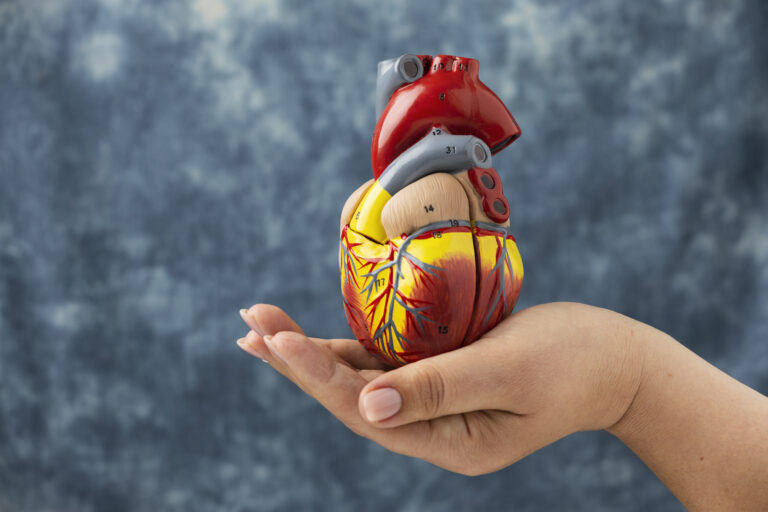Hypoplastic Left Heart Syndrome
Hypoplastic left heart syndrome (HLHS) is a congenital heart defect that is both complex and uncommon, occurring from birth. In this condition, there is a significant underdevelopment of the left side of the heart, which is a crucial component of the circulatory system responsible for pumping oxygenated blood throughout the body.
The left side of the heart includes the left atrium and the left ventricle, both of which are essential for supplying oxygen-rich blood to the body’s tissues and organs.

Symptoms
Newborns with hypoplastic left heart syndrome typically experience severe illness shortly after birth, presenting with the following signs and symptoms:
- Cyanosis, characterized by a bluish-gray skin color.
- Rapid and labored breathing.
- Difficulty with feeding.
- Cold extremities, including hands and feet.
- A weak pulse.
- Unusual drowsiness or lethargy.
These indicators highlight the critical nature of the condition and the urgent need for medical intervention and specialized care.
When to access Medical Care
Newborns born with hypoplastic left heart syndrome often face critical health challenges shortly after birth. If a baby exhibits any of the following issues: grayish-blue skin color (cyanosis), rapid and labored breathing, poor feeding, unusual drowsiness or lethargy, a weak pulse, and cold extremities, prompt medical intervention is imperative.
In the early hours or days of life, if the natural connections between the left and right sides of the heart, specifically the foramen ovale and ductus arteriosus, close prematurely in infants with hypoplastic left heart syndrome, it can lead to a state of shock and, potentially, a life-threatening situation. Therefore, timely medical attention is crucial to prevent these complications and ensure the best possible outcome for the child.
Determinants of risk
Hypoplastic left heart syndrome cannot be prevented. If you have a family history of heart defects or have a child with a congenital heart defect, it’s advisable to consult with a genetic counselor and a cardiologist experienced in congenital heart conditions before planning a pregnancy.
For those who already have a child with hypoplastic left heart syndrome, there is an increased risk of having another child with a similar condition. Beyond family history, there are no clearly defined risk factors for hypoplastic left heart syndrome.
Without surgical intervention, hypoplastic left heart syndrome is typically fatal, often within the first few days or weeks of life. Treatment has improved survival rates, although many individuals may experience complications later in life. Some of these potential complications encompass:
- Fatigue during physical activities or exercise.
- Heart rhythm problems, known as arrhythmias.
- Accumulation of fluids in the lungs, abdomen, legs, and feet (edema).
- Growth restriction.
- Formation of blood clots that could result in a pulmonary embolism or stroke.
- Cold extremities, including hands and feet.
- A weak pulse.
- Unusual drowsiness or lethargy.
Monitoring and specialized medical care are essential for individuals with hypoplastic left heart syndrome to manage these potential complications and ensure their overall well-being.
Recovery process
Recovery duration varies, contingent on factors like patient characteristics, chosen procedure, and the extent of severity.
Why entrust your care to us?
At Steps 2 Cure, our foundation of trust is built upon several key pillars that ensure your confidence in our services and expertise. Our team comprises highly qualified professionals with extensive experience in their respective fields. Their knowledge and skills enable us to offer you the best possible care and solutions for your medical needs. We understand that each individual is unique, and so are their healthcare requirements.
That’s why we prioritize tailoring our treatments and approaches to your specific circumstances, ensuring that you receive care that is truly designed for you. You are at the heart of everything we do. Your comfort, concerns, and aspirations guide our efforts. Our compassionate approach ensures that you feel valued and supported throughout your healthcare experience.
To commence the treatment procedure, you can start by forwarding your questions via WhatsApp at (+91 99xxxxxxxxx) or by sending an email to care@steps2cure.com. Our team will ensure a swift response to your queries.
Transcatheter Aortic Valve Implantation (TAVI)
Still have a Query?
Your health and peace of mind matter to us, and we’re dedicated to addressing any inquiries you may have with care and expertise. Feel free to reach out.
Subsribe To Our Newsletter
Stay in touch with us to get latest news and special offers.

